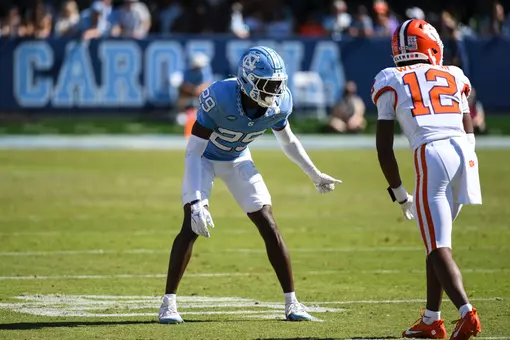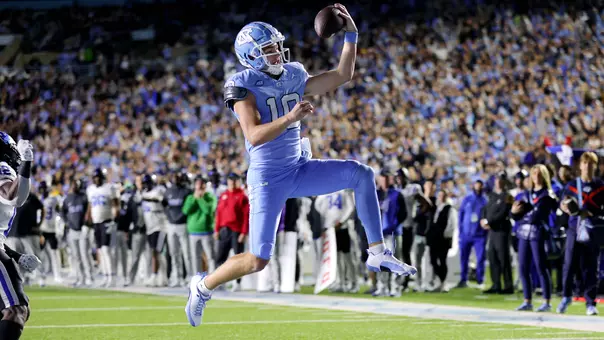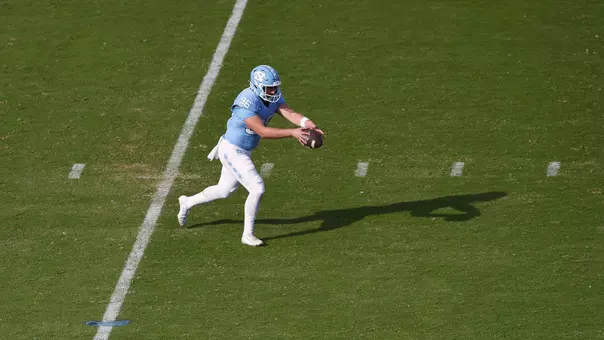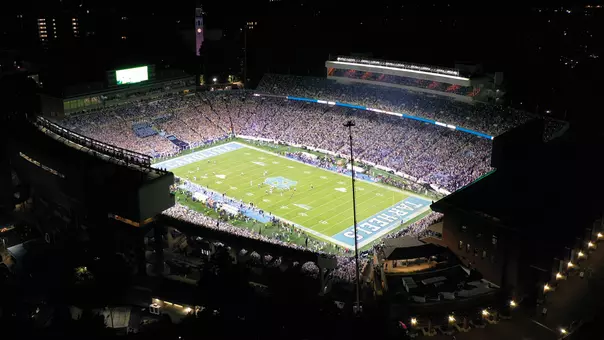University of North Carolina Athletics
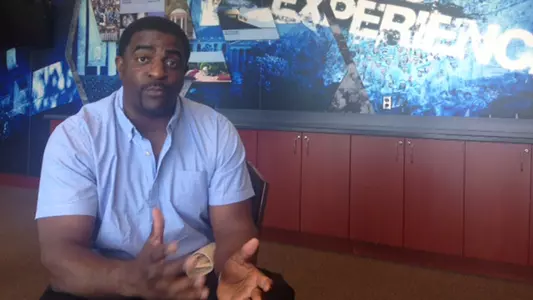
My Carolina Experience: Greg Ellis
June 30, 2015 | Football, Featured Writers, Lee Pace
by Lee Pace, GoHeels.com
CHAPEL HILL—Greg Ellis remembers well the afternoon in August 1997 when the Tar Heel football team made the migration from its old locker room in the original Kenan Field House to its fancy new digs on the west side in the new Kenan Football Center.
Coach Mack Brown and Chancellor Michael Hooker together carried a wooden box with a ram-head skeleton inside that represented the team's “Bad to the Bone” moniker.
Strength coaches Jeff Madden and George Smith pulled The Victory Bell, and a hundred-some players carried bags with their gear from the old headquarters to the new. Brown, Hooker, architect Glenn Corley and the seniors each cut snippets from a light blue ribbon stretched across the tunnel leading from the field into the building.
“I remember the new smell, I remember how excited everyone was,” Ellis says. “I remember it being very important to Coach Brown that we got to experience the new building. He felt like our class had a lot of to do with good stuff happening around the program at that time. I remember the first time we ran through the tunnel. I have a lot of fond memories here.”
Through the 1996 season, Ellis's junior year as a All-ACC and All-America defensive end, the Tar Heels were 35-8-1 in Kenan Stadium in the 1990s, including 5-0 in '96. They would win five of six at home in 1997 and notch back-to-back Top 10 finishes in 1996-97. The defense that Ellis was a part of limited opponents to an average of 217 yards and 11.5 points a game over two seasons. Six seniors were drafted and a free agent went on to NFL careers; five juniors would be drafted the following year from the defense.
“When you're in the middle of it you don't realize the unique situation you're dealing with,” Ellis says. “When you're removed from it in hindsight, it looks different. We were just kids, playing and having fun. We didn't realize at the time how great that team was on defense.”
Ellis grew up in Wendell and attended East Wake High and still has family there. When he visits the home of an aunt and uncle today, he sees a poster from the 1997 team still hanging that featured the Tar Heel seniors dressed in tuxedos.
“I see that poster and see Nate Hobgood-Chittick in that group,” Ellis says. “He wasn't drafted but he caught on with St. Louis and has a Super Bowl ring. That shows how stacked we were on defense. Guys who didn't start and weren't drafted still went on and had good NFL careers.”
When Ellis left Chapel Hill for a decade with the Dallas Cowboys, the Kenan Football Center had yet to be expanded to five floors and the original Kenan Field House stood in the east end zone. Now that's been razed and the new Loudermilk Center for Excellence has replaced it. Ellis marvels at the changes.
“It's amazing, it's like wow, this is amazing to know you had something to do with this program getting to the level it's at,” Ellis says. “It's great to come back and see Carolina at the same level if not better than many of the major powerhouses. This facility gives you a chance to stay competitive. The stadium still has the trees around it. They did a good job keeping the original and building on to it. It's phenomenal.”
Ellis was in Chapel Hill Monday to talk about his life after football—specifically, his role as producer of a new motion picture scheduled to be released later in the fall. Carter High is based on the true story of the 1988 state champion football team in Dallas, Texas, that had to overcome difficult off-the-field issues that threatened to split the school community and neighborhood. Director Arthur Muhammad was a member of that team.
Ellis was a communications major at Carolina and used his interests and skills as his NFL career wound down to start a production company in Dallas that did various photography, film and video projects. Muhammad was a freelance director who Ellis used on occasion.
“I told Arthur I wanted to take the next step, to get involved in producing,” Ellis says. “He showed me this script on Carter High. It was a very intriguing story. I thought for my first film, it would be the perfect starting point.”
One of the script's appeals to Ellis was that it showed team members making bad decisions, getting in trouble and facing painful disciplinary measures. Those are themes he's talked about frequently over two decades of speaking to school and youth groups. Decisions equal actions equal consequences.
“Anyone can make a bad decision,” Ellis says. “We're all faced with dozens of decisions every day. It's important to teach young kids that we need to make more right decisions than we do wrong ones. I tell people you always have choices—but look down the road and see how each choice might affect your life five or ten years away. What are the repercussions? That's what happens in this film. Kids sometimes don't understand the consequences of their decisions.”
Nearly two decades after his Tar Heel career ended, Ellis is grateful for his education and the skills he garnered from the classroom. “Lot of times, you never get to use your major in your career,” he says. “Fortunately, much of what I studied here I'm using in the film industry.”
He loves the idea that during the Great Depression, the film and movie industry remained strong. “People love to be entertained,” he says. “It takes them away for a little while from whatever problems they have.”
And he relishes the memory of the Tar Heels returning home in the wee hours in September 1996 after beating ninth-ranked Syracuse. The state of North Carolina had been ravaged by Hurricane Fran two days before, and Brown pitched the idea to his players that they should give the folks back home a special effort to help them through their power outages, flooded basements and crushed rooflines.
“We had a crowd of hundreds of people inspired enough to meet us when the busses drove in,” Ellis says. “Whatever negative stuff they were going through, they came out to tell us congratulations. That's what sports and movies can do for people.”
Chapel Hill writer Lee Pace (leepace7@gmail.com) in his 25th year writing “Extra Points” and 11th reporting from the sidelines for the Tar Heel Sports Network. His unique look at Tar Heel football appear regularly throughout the year. Follow him on Twitter @LeePaceTweet.











